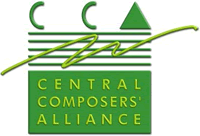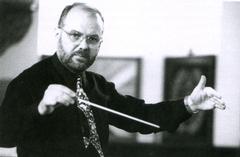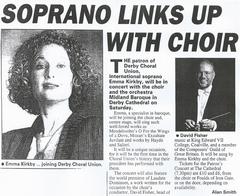Laudate Dominum
Instrumentation Soprano solo, SATB Choir + divisi + authentic classical orchestra: 2202 / 2200 / Timps / Strings Recording, download - 8.58MB Score, download - 0.06MB |
Other Information East Midlands Arts commission for Emma Kirkby, an authentic Classical orchestra and a large chorus. First performed by Dame Emma Kirkby, Derby Choral Union and Midland Baroque [Leader: Diane Terry] at Derby Cathedral in 1996 and repeated with the added Alleluia in March 1999. It was performed in a new version for organ by the Leicester Bach Choir under Giles Turner in November 1999. The completed cantata with Emma´s virtuoso insersion aria Laudate Dominum de caelis was performed in April 2003. The orchestration would suit modern instruments just as well, though the trumpets and horn parts are for natural harmonics) The recording which accompanies this page features the "Angel Aria" sung firstly by Dame Emma Kirkby [accompanied by authentic C18th instruments] at the first performance in 1996 and then by Katy Tansey [accompanied by a modern orchestra] at the Leicester Bach Choir performance in 1999. N.B. An organ score has been prepared for movements 1 & 3 ONLY. Soprano solo, SSATBB, 2 Fl, 2Ob, 2Cl [ad lib in movements 1 & 3], 2 Bn; 2Tr & 2 Hn [natural harmonics]; timps & tenor drum; Strings. The first movement of Laudate Dominum was written in 1996 as a commission for Dame Emma Kirkby, Derby Choral Union and an authentic Classical orchestra at A=430 with funds made available by East Midlands’ Arts. The Alleluia (now movement 3) was added for Emma Kirkby’s second concert with DCU in 1999. Later in 1999, the earlier movement was performed by the Leicester Bach Choir with Alison Smart in a new accompaniment for organ. Leicester Bach Choir, again conducted by Giles Turner, performed the entire work at that time in 2002 as part of the Leicestershire Composer’s concert accompanied by a modern orchestra (with soprano Kate Tansy) rather than for the authentic Classical orchestra for which it is written. It was always intended that these two movements should have an aria inserted between them to form a complete cantata with its first performance on 5th April 2003. Each of the three movements is linked by the theme for the ‘Angel Aria’ which is central to the first movement. The universality of the text “O praise the Lord all ye people” is emphasised by the use of four languages: Latin, German, English and French. It is in ternary form with an introduction and coda. After the horns and trumpets announce the fanfare theme which unifies the work, the choir sing all the languages in turn except for French, with two distinctive themes allocated to each text. The first section closes with the whole choir singing the fanfare figure before the soprano soloist begins the French text in a slow and lyrical melody in C major accompanied by pulsating strings, oboe solo and flutes. The choir joins the soloist in the second part of the middle section before a long cadence brings back the original E flat tonality. The third section begins with another choral fanfare before the reintroduction of all the earlier themes now in a multi-layered texture of increasing complexity. A giant eight-part double canon ensues and this is in turn followed by a shorter harmonised canon before the climax of the work is reached in two massive statements of “Laudate”. A tranquil section marks the re-entry of the soprano soloist to end the movement. The horns play a closing fanfare which ends the section as quietly as it began. Laudate Dominum omnes gentes, laudate eum omnes populi. Quoniam confirmata est super nos misericordia ejus et veritas Domini manet in aeternam. Lobet den Herrn, alle Heiden; preiset ihn, alle Völker! Denn seine Gnade und Wahrheit waltet über uns in Ewigkeit. O praise the Lord all ye nations: praise him all ye people. For his merciful kindness is great toward us: and the truth of the Lord endureth for ever. Louez l’Eternal, vous toutes les nations, célébrez-le, vous tous les peuples! Car sa bonté pour nous est grande, et sa fidélité dure à toujours. CRITICAL FEEDBACK: Emma Kirkby: "Thanks for a lovely bit of writing - for me and all the forces! I really enjoyed it." From an interview with Emma Kirkby and Pierre M. Bellemare (July 13, 2004) published in La Scena Musicale, Canada´s Classical Music Magazine: LSM [PMB]: “…and what about the music that David Fisher has composed for you?” EK: “David Fisher is a talented choirmaster and composer. He wrote a piece for me to do with the wonderful Derby Choral Union--one of Britains oldest groups and still very healthy today, and of which Im proud to be a patron. It is a very singable piece for me and there are bits that are great to listen to and pretty challenging to sing.” Liz Clarke [Derbyshire Now - February 1997]: "Emma Kirkby was provided with a vehicle to show a packed cathedral her superb talent and David Fisher even managed to stretch, test and ultimately show off the choir. [Emma Kirkby]...loves the unpredictability of performing live and her enjoyment of the piece was obvious. Her beautiful voice and those perfect high notes were heard to their best advantage...there was thunderous applause and David Fisher glowed with pride as he led Emma from the stage." Members of the audience wrote: "... the theme given to Emma [Kirkby] is one of the most beautiful themes I have ever heard. When I heard it my hair stood on end..." “I have attended many of your concerts and thoroughly enjoyed them but Saturday’s was something special. Your music and Emma’s voice – was so moving.” “It was wonderful! The entire concert seemed to have a brilliance such as we have never heard before. The atmosphere was truly electric.” “…your composition is dynamic, moving and challenging to sing! It has everything that music should have – and more.” Will Todd [composer]: "I was glad to hear the Laudate Dominum live - made the solo sections more immediate and beautiful. I really enjoyed it and I congratulate you...." Neil Crutchley [critic] "In his arresting Laudate Dominum David Fisher displays a natural gist for word-setting and melody that called to mind the music of John Rutter. Harmonic and rhythmic colour are allied to a vivid imagination to produc a moving and impressive work...enhanced in so small measure by Alison´s Smart´s enchanting solo contribution...that received a well rehearsed, enthusiastic perofrmance." Neil Crutchley, Leicester Mercury Review. Leicester Bach Choir conducted by Giles Turner, 6th November 1999 “Choirs need more composers like David Fisher. His own background is steeped in the English Choral Tradition and he understands the requirements of writing for amateur singers from the inside. His music is always rewarding to perform and holds the interest of listeners. His ‘Laudate Dominum’ was commissioned by East Midlands Arts and performed by one of his own choirs, the Derby Choral Union. The soprano soloist on that occasion was Emma Kirkby. The performance given by the Leicester Bach Choir was the first to use the specially prepared organ reduction. It was a well-rehearsed, confident and enthusiastic account with some impressive solo singing from Alison Smart. Inevitably, some loss of colour is lost in a reduction, but there was still plenty left in what proved to be a captivating fifteen minutes of musical pleasure. The novel idea of using four languages in the well-known text worked very well. Curiously, or even intentionally, the composer got a flavour of the German style in the German section and more than a whiff of Poulenc in the French! A unifying fanfare theme based on the Latin words recurs throughout the work and there a sections for soprano soloist, six-part choir and at one point and impressive eight-part double canon. In all this music, the composer’s musical ancestry is never in doubt. Vaughan Williams, Howells, Britten and Walton are there but there is also a distinct musical personality of his own. In its sensitivity to words and the great gift of singable melody his music also recalls to mind that of John Rutter and in the field of popular choral music of real quality, there can be no greater compliment.”
Paul Cauthen´s site on Emma Kirkby was the most comprehensive for information about this great singing phenomenon but alas it has been discontinued due to circumstances beyond Paul´s control
|




